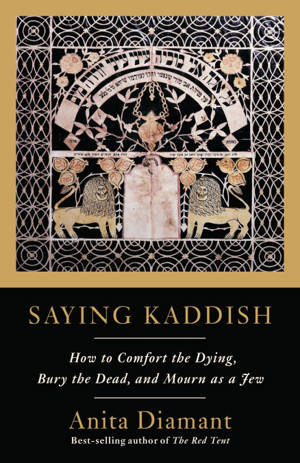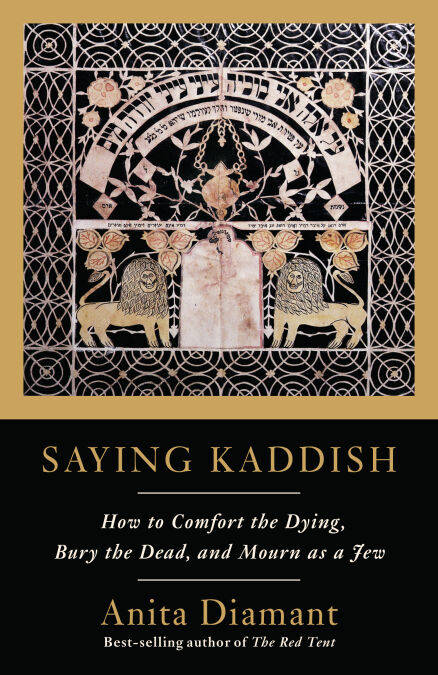
Bedankt voor het vertrouwen het afgelopen jaar! Om jou te bedanken bieden we GRATIS verzending (in België) aan op alles gedurende de hele maand januari.
- Afhalen na 1 uur in een winkel met voorraad
- In januari gratis thuislevering in België
- Ruim aanbod met 7 miljoen producten
Bedankt voor het vertrouwen het afgelopen jaar! Om jou te bedanken bieden we GRATIS verzending (in België) aan op alles gedurende de hele maand januari.
- Afhalen na 1 uur in een winkel met voorraad
- In januari gratis thuislevering in België
- Ruim aanbod met 7 miljoen producten
Zoeken
Saying Kaddish E-BOOK
How to Comfort the Dying, Bury the Dead, and Mourn as a Jew
Anita Diamant
E-book | Engels
€ 6,93
+ 6 punten
Uitvoering
Omschrijving
From beloved New York Times bestselling author and award-winning journalist—the definitive guide to Judaism’s end-of-life rituals, revised and updated for Jews of all backgrounds and beliefs.
From caring for the dying to honoring the dead, Anita Diamant explains the Jewish practices that make mourning a loved one an opportunity to experience the full range of emotions—grief, anger, fear, guilt, relief—and take comfort in the idea that the memory of the deceased is bound up in our lives and actions.
In Saying Kaddish you will find suggestions for conducting a funeral and for observing the shiva week, the shloshim month, the year of Kaddish, the annual yahrzeit, and the Yizkor service. There are also chapters on coping with particular losses—such as the death of a child and suicide—and on children as mourners, mourning non-Jewish loved ones, and the bereavement that accompanies miscarriage.
Diamant also offers advice on how to apply traditional views of the sacredness of life to hospice and palliative care. Reflecting the ways that ancient rituals and customs have been adapted in light of contemporary wisdom and needs, she includes updated sections on taharah (preparation of the body for burial) and on using ritual immersion in a mikveh to mark the stages of bereavement. And, celebrating a Judaism that has become inclusive and welcoming. Diamant highlights rituals, prayers, and customs that will be meaningful to Jews-by-choice, Jews of color, and LGBTQ Jews. Concluding chapters discuss Jewish perspectives on writing a will, creating healthcare directives, making final arrangements, and composing an ethical will.
From caring for the dying to honoring the dead, Anita Diamant explains the Jewish practices that make mourning a loved one an opportunity to experience the full range of emotions—grief, anger, fear, guilt, relief—and take comfort in the idea that the memory of the deceased is bound up in our lives and actions.
In Saying Kaddish you will find suggestions for conducting a funeral and for observing the shiva week, the shloshim month, the year of Kaddish, the annual yahrzeit, and the Yizkor service. There are also chapters on coping with particular losses—such as the death of a child and suicide—and on children as mourners, mourning non-Jewish loved ones, and the bereavement that accompanies miscarriage.
Diamant also offers advice on how to apply traditional views of the sacredness of life to hospice and palliative care. Reflecting the ways that ancient rituals and customs have been adapted in light of contemporary wisdom and needs, she includes updated sections on taharah (preparation of the body for burial) and on using ritual immersion in a mikveh to mark the stages of bereavement. And, celebrating a Judaism that has become inclusive and welcoming. Diamant highlights rituals, prayers, and customs that will be meaningful to Jews-by-choice, Jews of color, and LGBTQ Jews. Concluding chapters discuss Jewish perspectives on writing a will, creating healthcare directives, making final arrangements, and composing an ethical will.
Specificaties
Betrokkenen
- Auteur(s):
- Uitgeverij:
Inhoud
- Aantal bladzijden:
- 256
- Taal:
- Engels
Eigenschappen
- Productcode (EAN):
- 9780805212181
- Verschijningsdatum:
- 6/08/2007
- Uitvoering:
- E-book
- Beveiligd met:
- Adobe DRM
- Formaat:
- ePub

Alleen bij Standaard Boekhandel
+ 6 punten op je klantenkaart van Standaard Boekhandel
Beoordelingen
We publiceren alleen reviews die voldoen aan de voorwaarden voor reviews. Bekijk onze voorwaarden voor reviews.









